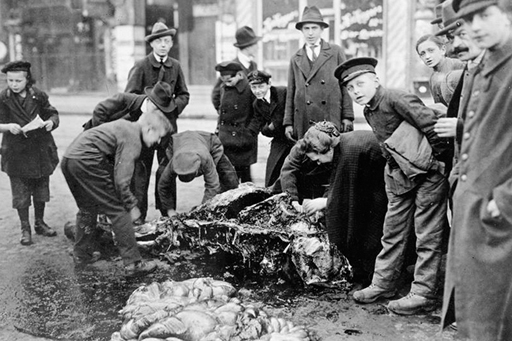2.2 Hunger
As the war dragged on, civilians increasingly began to be affected by shortages resulting from blockades and from the demands the war machine placed upon the combatants’ economies.
Germans claimed after the war that 750,000 civilians had died as a result of the British blockade of Germany, which wartime chancellor, Theobald von Bethmann Hollweg, described as a ‘barbaric way of waging war’.
Hunger was an experience familiar to many during the four long years of war. Most of the estimated 700,000 or more civilian casualties in Germany died from the consequences of hunger during the war. This figure does not include all the victims of the Spanish influenza epidemic, which struck at the end of the war and claimed as many as 350,000 victims in Germany, many of whom had been weakened by malnourishment.
Astonishingly, these staggering figures have hardly been remembered in Germany, where the civilian losses of the Second World War have featured much more prominently in public memory. Estimates for these losses are also imprecise, but are thought to be between 500,000 and 600,000 civilians, many of them lost in Allied bombing raids on German cities. Not many Germans know that twice as many civilians were mourned as a result of the First World War.
Throughout the war, Britain used its naval superiority to enforce a blockade on Germany, inhibiting the supply of crucial raw materials and foodstuffs. This was a factor in creating food shortages in Germany, although historians now believe that the effect of the blockade has been exaggerated, and that shortages were also a result of mismanagement of resources and supplies. The fact remains, however, that during the First World War (and in the months that followed the Armistice, when the British blockade continued), many civilians went hungry and suffered from cold. For the German government, it was easy to blame the British blockade for the deprivation its people experienced, even though the reality was more complicated.
German agriculture was severely affected by shortages of grain, fodder and fertilisers, and this was further exacerbated by a poor potato and wheat harvest in 1916. As a consequence, turnips, which were neither appetising nor nutritious and had previously been mainly used as animal fodder, were widely used as a substitute foodstuff, resulting in the so-called ‘Turnip Winter’ of 1916/17.
Shortages also encouraged a flourishing black market, exorbitant food prices and tensions between communities when it was felt that food was not being distributed equitably. These factors all contributed to declining morale and increasing unrest on the German home front – both of which would severely undermine the German war effort and contribute to its ultimate demise. Before the German army was defeated, Germany had arguably already been defeated economically – starvation had made the population weary of war and unwilling to contemplate yet another winter at war.

